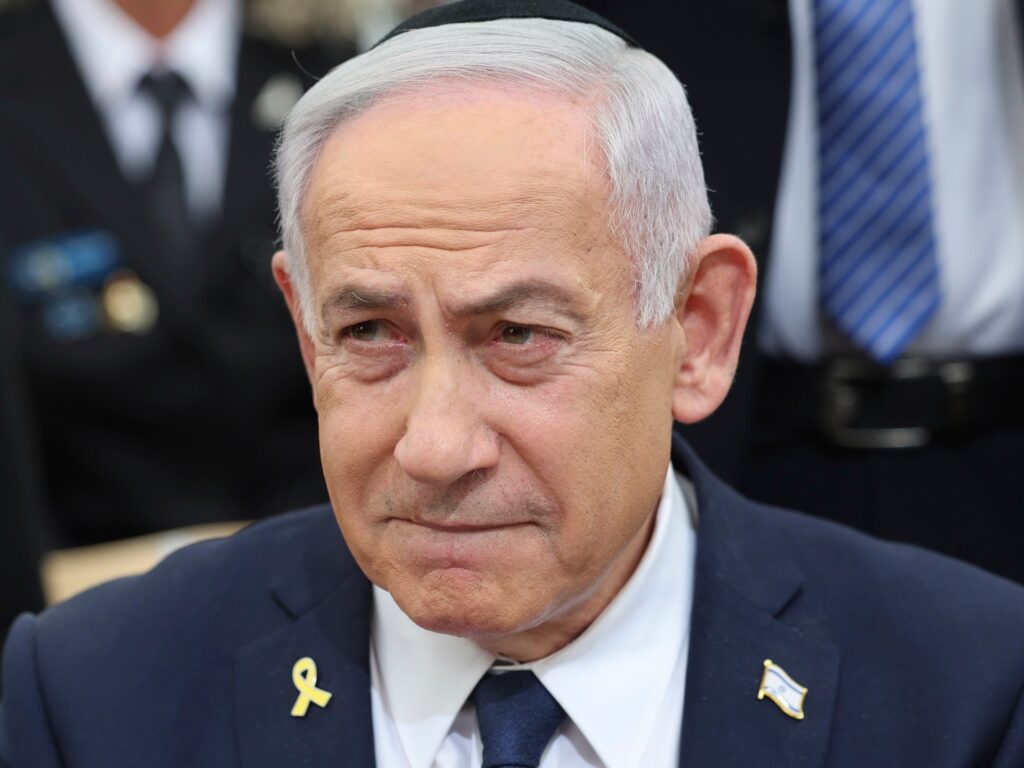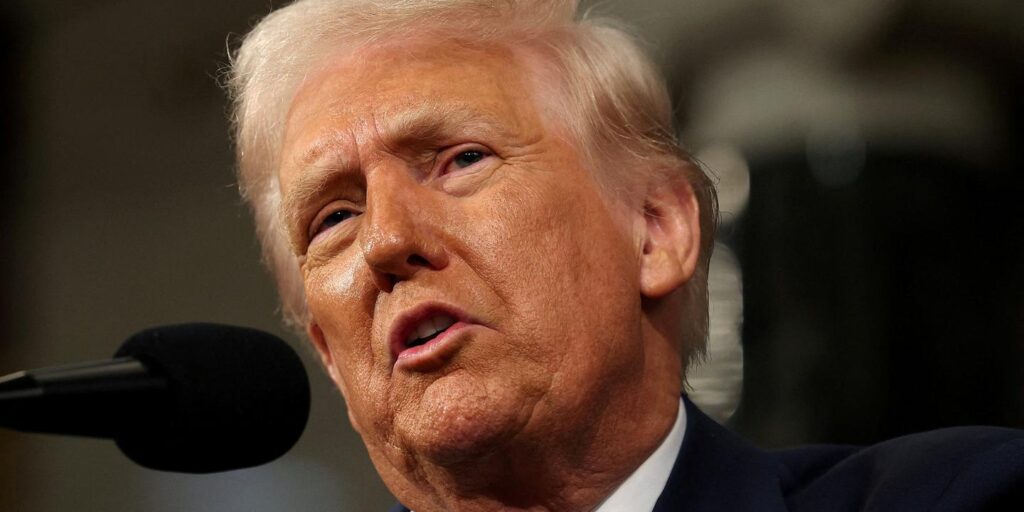Two confidence votes, each fewer than seven days apart, tell much of the story of Israel’s political transformation since it launched attacks on longstanding regional nemesis Iran on Friday.
Early on Thursday, Prime Minister Benjamin Netanyahu’s far-right government narrowly survived a vote that ensured its continuation after an 11th-hour deal was reached with ultra-Orthodox parties who are a key force within it. Had a deal not been found, then parliament would have been dissolved and new elections called, leaving Netanyahu vulnerable as opposition against him grew.
But then on Monday, a similar attempt to dissolve parliament failed miserably after no confidence motions brought forward by parties led by Palestinian citizens of Israel failed to attract any support from the centre and the right.
Of course, in between, Israel had launched its attacks on Iran, upending domestic Israeli politics as well as regional geopolitics.
Rejecting Monday’s no confidence motions, opposition politician Pnina Tamano-Shata – who has been critical of Netanyahu in the past – told lawmakers the efforts were “disconnected from reality”.
That is now the mainstream view in Israeli politics, with opposition parties falling into line behind Netanyahu and a war against Iran that the prime minister has been promoting for at least two decades.
Writing in Israeli media the day after Israel’s strikes on Iran began, former Prime Minister and self-styled centrist Yair Lapid, who less than a month earlier had been calling upon the prime minister to seek a truce in Gaza, wrote of his full support for the attacks on Iran while urging the United States to participate in the war. He was then pictured shaking Netanyahu’s hand with a map of Iran on a wall behind the two men.
Prime Minister Benjamin Netanyahu met today with Leader of the Opposition MK Yair Lapid for a security update. pic.twitter.com/dvCMEjivXb
— Prime Minister of Israel (@IsraeliPM) June 17, 2025
Former right-wing Prime Minister Naftali Bennett, whom polls have shown to be a favourite to replace Netanyahu if early elections were called, also told Israeli media: “There is no right, no left, no opposition and no coalition” in regard to the attacks on Iran.
Speaking to Al Jazeera on Tuesday, Aida Touma-Suleiman, a member of parliament representing the Hadash-Ta’al Party, said: “Politically, the switch to supporting the war by the main opposition isn’t surprising. It took them a year and a half to say it’s forbidden to kill children. It will probably take them another year and a half to realise they don’t automatically have to fall in behind Netanyahu every time there’s a new crisis.”
“There are no voices in Israel questioning this, apart from us, and we’re Palestinians and leftists, so apparently not to be trusted,” Touma-Suleiman said. “Even those who call themselves the Zionist left are supporting the war.”
“Israelis are raised being told they’re in danger and that they’re going to need to do everything they can to survive,” she added.
Changed fortunes
Only last week, things seemed very different. Domestically, Netanyahu and his coalition were under pressure from a parliament, public and even military that appeared to have grown tired of the country’s seemingly endless war on Gaza.
Open letters protesting the burden that the war was imposing upon Israeli lives and, in some cases, Palestinian ones had come from members of the military and from within its universities and colleges. Large numbers of reservists were also believed to be refusing to turn up for duty.
There was also pressure to hold an inquiry into Netanyahu and his government’s failure to prevent the October 7, 2023, attacks on Israel, and a corruption trial that has haunted Netanyahu since 2019 rumbled on.

Now, the prime minister leads a public and parliament that, apart from a few notable exceptions, appears united behind his leadership and its new attacks upon an old enemy, Iran. That is despite the unprecedented attacks that Israel has faced over the past week with ballistic missiles crashing into Tel Aviv, Haifa and other Israeli cities – killing at least 24 Israelis.
On Monday, a poll conducted by Israel’s Channel 14 showed “overwhelming” public support for the prime minister with editorials and coverage across much of the Israeli media similarly supportive of the prime minister.
On Tuesday, one of the country’s leading newspapers, The Times of Israel, echoed the claims of politicians, such as Lapid, that Iran was committing war crimes in response to Israel’s unprovoked attacks on Friday, itself deemed illegal by some legal scholars. No mention was made of the accusations of genocide against Israel being considered by the International Court of Justice or the warrants for war crimes issued against Netanyahu and former Defence Minister Yoav Gallant by the International Criminal Court.
“Through a (long) campaign led by Netanyahu and others, the idea that Iran is the source of all anti-Israeli sentiment in the region, not the plight of the Palestinians, who are occupied and subjected to ethnic cleansing, has largely become entrenched within Israeli politics,” Israeli political analyst Nimrod Flaschenberg said of the dramatic political unity that has followed on the heels of Friday’s attacks. “The idea that Iran is the source of all evil has become embedded across Israeli society.”

Uncertain future
However, Netanyahu has squandered support before, and he may do so again.
Much like in Gaza, Netanyahu has set maximalist war aims. In Gaza, it was a “total victory” over Hamas while with Iran he has said Israel will end Iran’s nuclear programme and even suggested the possibility of regime change in Tehran.
Netanyahu may find once again that it is easy to start wars but not to finish them in a manner that is satisfactory to his political base.
“Netanyahu is making a big gamble,” Dov Waxman, professor of Israel studies at the University of California-Los Angeles, told Al Jazeera. “If the war doesn’t succeed in destroying Iran’s nuclear programme or forcing Iran to make unprecedented concessions to reach a new nuclear agreement, then it will be considered a failure in Israel, and this will no doubt hurt Netanyahu politically. And if the war drags on and Israeli casualties continue to mount, then Israeli public opinion may well turn against the war and blame Netanyahu for initiating it.”
However, the degree to which a change in the public and political mood may act as a check upon Netanyahu and his government is unclear. Netanyahu has repeatedly ignored the public pressure to find a deal to secure the release of Israeli captives held in Gaza with some government members even directly criticising family members of captives.
“Netanyahu has just weeks, maybe even days, of public support left to him if the damage continues,” Flaschenberg said, “But as we’ve seen in Gaza, that doesn’t really matter. So if he does stretch it out, as part of his apparent policy of endless war, then that’s what he’ll do. The only thing that can really stop this new war is a decisive stand by the US. That’s it.”


